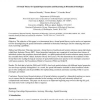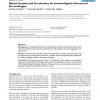35 search results - page 1 / 7 » A formal theory for spatial representation and reasoning in ... |
ARTMED
2006
13 years 4 months ago
2006
Objective: The objective of this paper is to demonstrate how a formal spatial theory can be used as an important tool for disambiguating the spatial information embodied in biomed...
BIOINFORMATICS
2007
13 years 4 months ago
2007
The formal representation of mereological aspects of canonical anatomy (parthood relations) is relatively well understood. The formal representation of other aspects of canonical ...
BMCBI
2007
13 years 4 months ago
2007
Background: An adequate and expressive ontological representation of biological organisms and their parts requires formal reasoning mechanisms for their relations of physical aggr...
KRMED
2004
13 years 5 months ago
2004
The symbolic representation of the physical structure of living organisms needs an ontologically well-founded and logically sound approach so that formal reasoning can adequately ...
IJAR
2006
13 years 4 months ago
2006
In spatial reasoning, in particular for applications in image understanding, structure recognition and computer vision, a lot of attention has to be paid to spatial relationships ...


